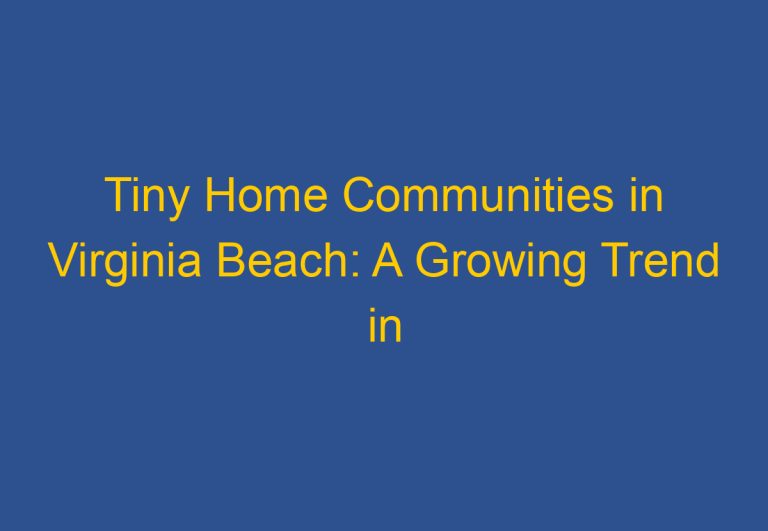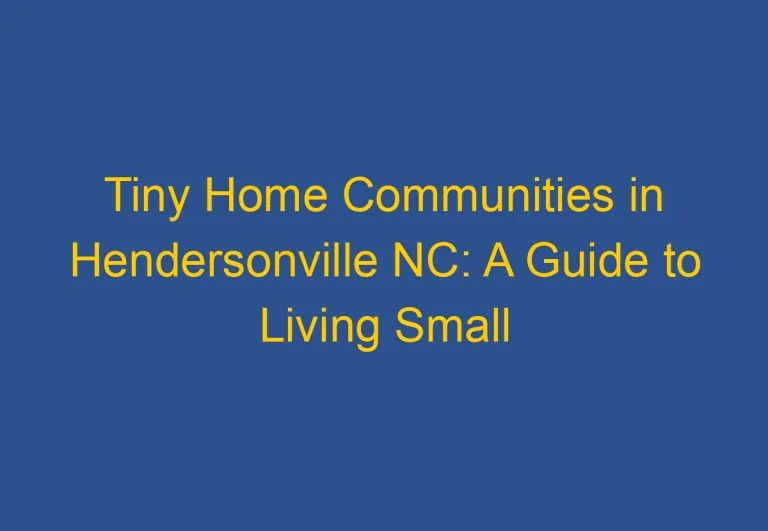Tiny Home Communities in Michigan: A Guide to Finding Your Perfect Community
Michigan is home to a growing number of tiny home communities, offering residents a unique opportunity to embrace a more sustainable and minimalist lifestyle. These communities are designed with a sense of community in mind, encouraging residents to connect with one another and build meaningful relationships. For those looking to downsize and simplify their lives, tiny home communities in Michigan offer an affordable housing option that doesn’t sacrifice comfort or style.
One of the key benefits of living in a tiny home community is the sense of community that it provides. Residents are able to connect with like-minded individuals who share a passion for sustainable living and a desire to simplify their lives. This sense of community is fostered through shared spaces and communal areas, such as gardens, community centers, and outdoor spaces.
In addition to the sense of community, tiny home communities in Michigan offer a sustainable lifestyle that is both environmentally friendly and cost-effective. With smaller living spaces, residents are able to reduce their carbon footprint and live a more eco-friendly lifestyle. Furthermore, the affordability of tiny homes makes them an ideal housing option for those looking to live a more frugal and financially responsible lifestyle.
Exploring Tiny Home Communities in Michigan
Benefits of Tiny Living in Michigan
The tiny house movement has been gaining popularity in Michigan, and for good reason. Living in a tiny home has several benefits, including reduced living expenses, lower environmental impact, and a simpler lifestyle. Michigan’s abundance of natural beauty and outdoor recreation opportunities make it an ideal location for those seeking a minimalist lifestyle.
Popular Locations for Tiny Homes
Michigan has several popular locations for tiny homes, including Detroit, Grand Rapids, Ann Arbor, Traverse City, Lansing, and Kalamazoo. The Great Lakes and Lake Michigan also provide scenic locations for tiny home communities. Briley Township in the Upper Peninsula is a popular location for tiny homes due to its relaxed zoning laws.
Types of Tiny Home Communities
Michigan has several types of tiny home communities, including tiny home villages, RV resorts, and tiny house communities. Tiny Homes Detroit is a subdivision of modest, one- and two-person tiny homes built for low-income tenants by Cass Community Social Services. The Lake Shore Tiny Home Community in Whitehall is situated along the shores of Lake Michigan and places a strong emphasis on sustainable practices and green living.
Michigan’s Tiny House law allows couples to build a home of about 250 square feet, while houses for families of four must be at least 450 square feet. Tiny homes in Michigan must meet all local building codes and zoning requirements.
Overall, Michigan offers a variety of options for those interested in the tiny house lifestyle. From urban tiny home communities to rural tiny house parks, Michigan has something for everyone seeking a simpler way of life.
Regulations and Amenities
Local Zoning and Building Codes
When it comes to tiny home communities in Michigan, local zoning and building codes play a crucial role. The International Residential Code (IRC) provides a framework for building codes at the national level, but individual counties and cities can have their own local building codes and zoning requirements. It’s important to research the specific regulations in the area where you plan to build or live.
Michigan’s tiny home regulations require a foundation at least 24″ above the ground, solid wood or metal walls, and a metal roof. Double-paned windows and insulated doors are also mandatory. For those who plan to live in a tiny home on wheels, parking regulations vary from city to city. For instance, in East Lansing, tiny homes on wheels cannot be parked on city streets for more than 48 hours, while in Detroit, tiny homes are generally not allowed on residential properties.
Community Amenities and Lifestyle
Tiny home communities in Michigan offer a minimalist lifestyle with a focus on simplicity and sustainability. Many communities offer amenities like a spa, pool, fitness center, clubhouse, fishing, and tennis court. Some communities even have storage space for residents to store their belongings.
Living in a tiny home community means embracing a minimalist lifestyle, which can be a great opportunity to declutter and simplify one’s life. Residents can enjoy a comfortable bedroom, living room, kitchen, and bathroom in a compact space. Some communities also offer laundry facilities, meeting rooms, and fire pits. Solar panels and other energy-efficient features are often included in tiny home communities to promote sustainability.
In conclusion, tiny home communities in Michigan offer a unique living experience for those who value simplicity, sustainability, and community. It’s important to research local laws and regulations before building or living in a tiny home community to ensure compliance with local zoning and building codes. With a variety of amenities and a focus on a minimalist lifestyle, tiny home communities in Michigan can be a great option for those looking for a simpler way of life.
Frequently Asked Questions
What are the top-rated tiny home communities in Michigan?
Michigan has several top-rated tiny home communities, including Tiny Homes Detroit, Tiny House Community near Ann Arbor, and Green Street Tiny Homes in Grand Rapids. These communities offer unique living experiences and a range of amenities, making them popular among those seeking a minimalist lifestyle.
How much does it typically cost to join a tiny home community in Michigan?
The cost of joining a tiny home community in Michigan varies depending on factors such as location, amenities, and size of the home. Generally speaking, the cost of purchasing a tiny home in Michigan ranges from $30,000 to $100,000. Additionally, some communities charge monthly rent or association fees, which can range from a few hundred to a few thousand dollars.
Can you recommend any tiny home communities in Michigan that offer homes for rent?
Yes, there are several tiny home communities in Michigan that offer homes for rent, including Green Street Tiny Homes in Grand Rapids and Tiny House Siesta in Detroit. These communities offer a range of rental options, from short-term stays to long-term leases, and are ideal for those who want to experience tiny home living without the commitment of purchasing a home.
What are the zoning regulations for tiny homes in Michigan counties?
Zoning regulations for tiny homes in Michigan counties vary depending on the county and the specific community. Generally speaking, tiny homes are classified as accessory dwelling units (ADUs) and are subject to the same zoning regulations as other ADUs. It is important to research and understand the zoning regulations in your area before purchasing or building a tiny home.
Are there affordable tiny home communities located near Ann Arbor or Grand Rapids?
Yes, there are several affordable tiny home communities located near Ann Arbor and Grand Rapids, including Tiny House Community near Ann Arbor and Green Street Tiny Homes in Grand Rapids. These communities offer a range of affordable housing options and are ideal for those looking to live a minimalist lifestyle without breaking the bank.
How do tiny home communities in Michigan compare to those in other states in terms of amenities and services?
Tiny home communities in Michigan offer a range of amenities and services that are comparable to those in other states. Many communities offer communal spaces, such as gardens, outdoor seating areas, and community centers, as well as services such as laundry facilities, trash collection, and security. However, it is important to research and compare different communities to find the one that best fits your needs and lifestyle.










